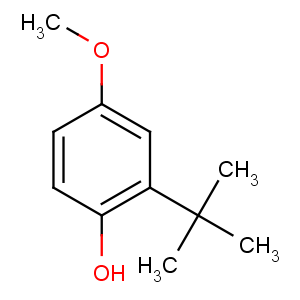Title: Butylated Hydroxyanisole
CAS Registry Number: 25013-16-5
CAS Name: (1,1-Dimethylethyl)-4-methoxyphenol
Synonyms: 2(3)-
tert-butyl-4-hydroxyanisole; BHA
Trademarks: Antrancine 12 (Jandekker); Embanox; Nipantiox 1-F (Nipa); Sustane 1-F (UOP); Tenox BHA (Eastman Kodak)
Molecular Formula: C11H16O2
Molecular Weight: 180.24
Percent Composition: C 73.30%, H 8.95%, O 17.75%
Literature References: A mixture of
2-tert-butyl-4-methoxyphenol (also called 3-
tert-butyl-4-hydroxyanisole) and
3-tert-butyl-4-methoxyphenol (also called 2-
tert-butyl-4-hydroxyanisole). Prepn from
p-methoxyphenol and isobutene: R. H. Rosenwald,
US 2459540;
US 2470902 (both 1949 to Universal Oil Products). Toxicity study: A. J. Lehman
et al., Adv. Food Res. 3, 197 (1951). Review of carcinogenic risk:
IARC Monographs 40, 123-159 (1986); antimicrobial activity: M. Riccach,
J. Food Saf. 6, 141-170 (1984); of physicochemical properties, antioxidant activity and toxicology: H. Verhagen
et al., Chem. Biol. Interact. 80, 109-134 (1991); of safety assessment as food additive: G. M. Williams
et al.,
Food Chem. Toxicol. 37, 1027-1038 (1999).
Properties: Waxy solid, mp 48-55°. bp733 264-270°. Practically insol in water. Sol in petr ether (Skellysolve H), in 50% alcohol (or higher), in propylene glycol; alcohols. Sol in fats and oils. Exhibits antioxidant properties and synergism with acids, BHT, propyl gallate, hydroquinone, methionine, lecithin, thiodipropionic acid, etc. LD50 in mice, rats (mg/kg): 2000, 2200 orally (Lehman).
Melting point: mp 48-55°
Boiling point: bp733 264-270°
Toxicity data: LD50 in mice, rats (mg/kg): 2000, 2200 orally (Lehman)
CAUTION: This substance is reasonably anticipated to be a human carcinogen:
Report on Carcinogens, Eleventh Edition (PB2005-104914, 2004) p III-40.
Use: Antioxidant and preservative, esp in foods, cosmetics, pharmaceuticals; also rubber and petroleum products.

